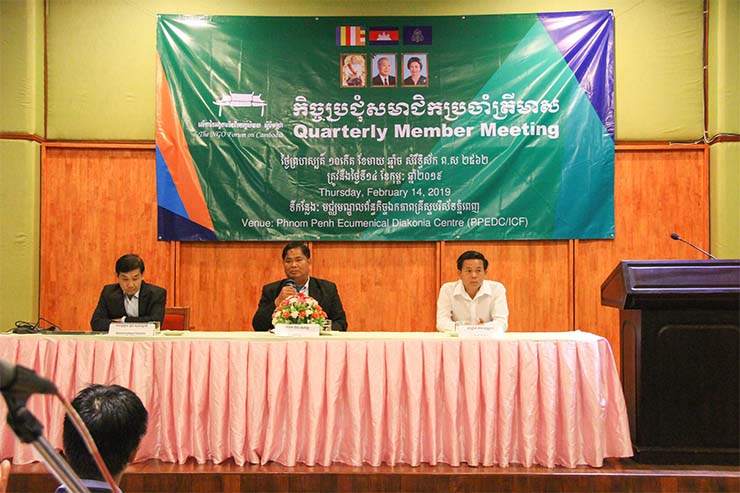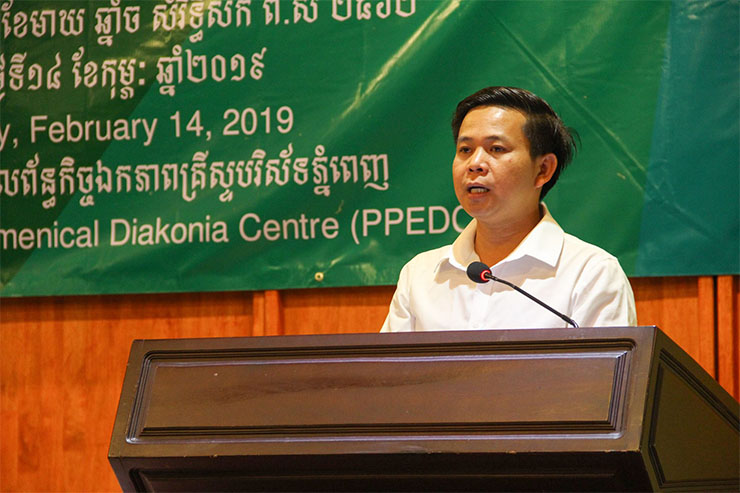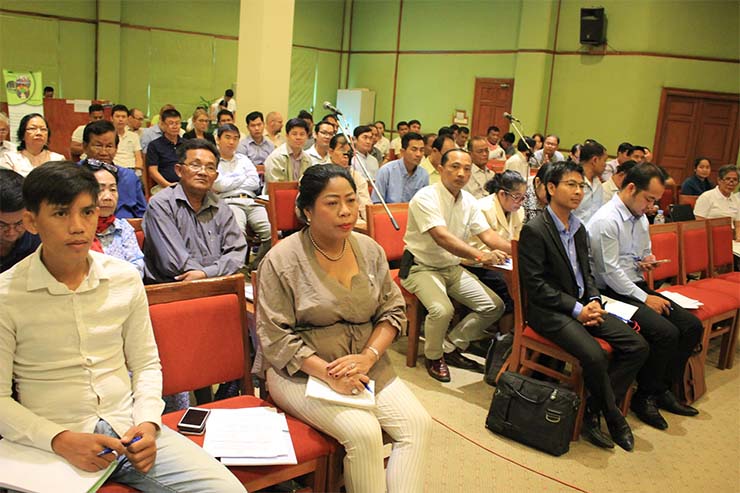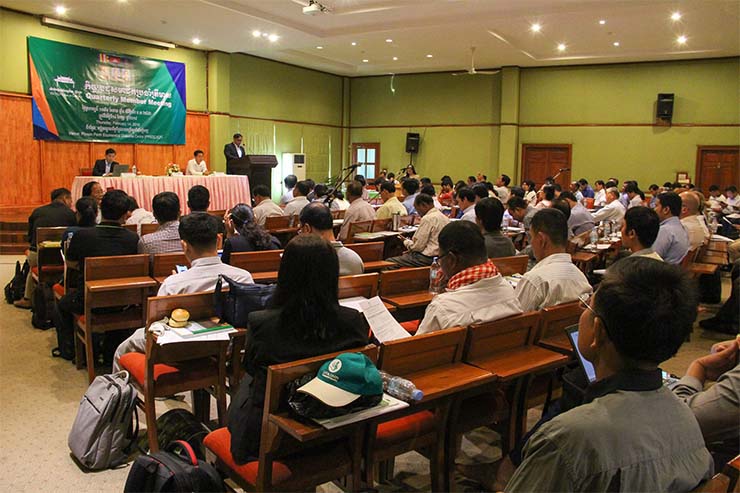
The NGO Forum on Cambodia’s (NGOF) quarterly member meeting held on February 2019 at Phnom Penh Ecumenical Diakonia Centre (PPEDC/ICF) from 08:00 – 12:00 presided over by Mr. Ngin Saorath, Member of NGOF’s Management Committee and Executive Director of CDPO. There were 122 participants (27 female) represented to NGO members of NGOF in Cambodia.
Key guest speakers from the Ministry of Planning, Ministry of Interior, Ministry of Land Management, Urban Planning and Construction participated in the presentation on the 1) updating significant progress report of NGOF; 2) Update on the framework of Cambodia’s sustainable development goals focus on the presentation on the framework of Cambodia’s sustainable development goals, Presentation on disability social development program; 3) Update on the process of amendments to laws on Forestry, Fisheries and Protected areas focus on the presentation on progress of amendments to law on Forestry, Fisheries and Protected areas, presentation on the National Authority for Land Dispute Resolution, presentation on the draft of NSDP 2019-2023 focus on Gender, presentation on the Australia Awards Scholarships for Intake 2020.
Quarterly, NGOF invited its members, donors, and partners who were supporting NGO’s mission to quarterly members meeting. The meeting discussed on key achievements, challenges, lesson learned, good practice and feedback from members for further implement next quarter work plan.
Mr. Ngin Saorath, chair of the meeting, gave a warm welcome and thanked all NGO members, government, and development partners for their participation in the important meeting. Chair of meeting informed the meeting objectives to share information with NGO members and discuss their challenges and needs in order to accomplish the goal as set in the NGOF work plan. Chairman also briefed the key agendas of meeting as the following: 1) Update on significant quarterly progress report of NGOF; 2) Update on the framework of Cambodia’s sustainable development goals; 3) Update on the process of Amendments of laws on Forestry, Fisheries, and Protected areas. NGO Forum has good cooperation with key relevant ministries such as MOE, MAFF, MRD, MOEF, Ministry of Land and coordinated with network members to accomplish many key achievements within the last quarter.

Mr. Tek Vannara also briefly updated about the progress of NGOF on the following. Here were the key achievements from November 2018 to February 2019 in the following:
• On 14-15 November 2018 organized annual membership organization and annual network meeting to reflect key achievements, challenges and review action plan of network and NGO Forum in 2019.
• On 21 November 2018 attended 13th ASEAN NGOs meeting on social welfare and social development in Singapore to develop a master plan for 2025 to mainstream the rights of disability which organized by International Council for social welfare.
• On 27 November 2018 co-organised with IUCN the CSO forum on NRM. Total of 133 participants.
• On 28 November 2018 attended Global Conference on Sustainable Green Economy focused on climate change, vast management, NRM, production, the growth of economic development and poverty reduction in Kenya.
• On 29 November 2018 organized 14th donors/ partners meeting.
• On 28-29 November 2018 attended a sub-national workshop to collect CSO inputs on draft NSDP with inter-ministries in Kampong Chhnang province.
• On 13 December 2018 organized CSO Leader meeting to update NSDP from Kampong Chhnang province to review CSO inputs.
• On 05 December 2018 coordinated CSO exposure visit to kbal Romeas village, Stung Treng province which involved by inter-ministries including Ministry of Rural Development, Ministry of Interior, Stung Treng government, My village and local authorities. Total of 80 participants.
• On 06 December 2018 organized National budget preparation for 2019 awareness raising workshop. Total of 100 participants.
• On 06 December 2018 attended Mekong Regional Forum on water, food, and energy in Myanmar.
• On 07 December 2018 organized National consultation workshop on NSDP to consolidate the recommendation submit to MoP. Total 34 representatives from NGOs, private sectors and researchers.
• On 11 December 2018 co-organised the Regional workshop on energy development and renewable energy for regional countries with Stimson Center, IUCN. Total of 52 participants.
• On 13 December 2018 organized National dissemination workshop the report on fair compensation guideline involved by 6 ministries. MoEF sub-decree on fair and just compensation. Total of 65 participants.
• On 14 December 2018 organized a workshop on promoting quality and safety of agriculture products and food in Siem Reap province. Total of 200 participants.
• On 17 December 2018 organized National consultation workshop on collecting inputs NSDP and submit the input to TWG. Total of 160 participants.
• On 17 December 2018 organized National consultation workshop on draft statistical analysis report on the land dispute. Total of 60 participants.
• On 24-30 December, organized 2018 National Program Reflection workshop in Stung Treng and Champasak provinces, Lao PDR to develop an operational plan and budget plan 2019, coordination plan 2019, annual progress report for 2018, learning on NRM, Don Sahong dam, water governance, and Ramsar area.
• On 03-04 January 2019 attended Water partnership workshop for integrated water resource management with CNMC and CWP.
• On 26 January 2019 attended TWG- CC meeting.
• On 25-27 January 2019 conducted exposure visit to Koh Kong, Pursat province to visit UDG, Thmorda and Chi Phat.
• On 28 January 2019 organized Dissemination Workshop on Climate Change Adaptation (CCA)/Disaster Risk Reduction (DRR) mainstreaming into Commune Investment Plan (CIP)/Commune Development Plan (CDP) held on January 28, 2019, at Himawari hotel.
• On 28 January 2019 attended the inter-ministries meeting and presented the CSOs inputs on NSDP with inter-ministries and TWG.
• On 8 February 2019 attended meeting with the ministry of land on commune land titling and land law.
• Organized VGGT workshop with ActionAid on NRM, land, and fishery.

Update on the framework of Cambodia’s sustainable development goals
Guest Speaker 1: H.E Poch Sovanndy, Representative of Ministry of Planning presented on the framework of Cambodia’s sustainable development goals 2015-2030. The process of preparation CSDG. Member of the UN faced some challenges. Identify key points and select the new point and integrate into NSDP and existing mechanism. Started in early 2015. Organized many meetings with inter-ministries. February 2018, independence consultant developed the framework of Cambodia’s sustainable development goals 2015-2030. Discussed with the committee of economic policy and finance on 24 April 2018. Improve the indicator for a small group. Divided into two parts. The first part to review the result. The first part has five chapters. The second part of 2016-2030 added four more points. The global indicator has 244 points. Cambodia selected 52 points. Divided indicators 23. Improved and developed new indicators. It takes 3 stages in every five years. Way forward. It will be published in the next ten days. It will be disseminated at national and three sub-national levels. Monitoring and evaluate in every two years.
Guest Speaker 2: Mr. Mean Vibolratanak of CDPO, Presented on disability social development program.
Organized General Assembly in every five years.75 DPO at provincial, district and commune levels. Establish in 1994. Working on disability rights with government national policy. Four
programs. Monitoring national policy. National Election Committee. Many policies related to disability. The second program conducts awareness raising and radio program on disability voice. Provide capacity building to the private sector, NGO such as Child Fund Cambodia. The third program DPO development to integrate disability in a commune investment fund. The fourth program of Organizational development.
What is Disability Inclusive Development? The process of including disable person in your program.
Update on the process of amendments to laws on Forestry, Fisheries and Protected areas.
Guest Speaker 1: H.E. Chhin Tephirum, NCDN, Advisor of Ministry of Interior, presented the amendments to laws on Forestry, Fisheries and Protected areas.
Currently, the Chair of the committee is H.E Sar Kheng, Deputy Prime Minister and Minister of Interior. Coordinate with other ministries for formulation the organic law. There are five steps of the process of the amendment. Since 2011 the advisory committee was established to review the law on Decentralization and Deconcentration. The principle of the amendment of the three laws based on the following:
1). To review the division of management, role and responsibility and management of the sub-national level implementation of the ministry of agriculture and ministry of Environment (ministry of agriculture manages forestry and fishery outside the protected area and ministry of Environment manage the forestry and fishery inside the protected area); 2). Divide the role of forest management and fishery between the ministry and sub-national authority. Ministry of Agriculture and Ministry of Environment has the role to develop national policy, national strategic planning, national land use planning, technical standard, audit, and capacity building. The sub-national authority has the role to manage, protect, develop and conserve forestry, fishery and another national resource in their location according to policy and technical standard defined by the national authority.
The forestry administration working through their mechanism from the national and sub-national follow D&D. It is at the end stage of the amendment. Inter-ministries technical working group has prepared the first draft of the amendments of three laws through many meetings. Since April 2017, the sub-national consultations were conducted to review the draft amendment.1). Law on the protected area has reviewed and improve it by TWG. The forestry law not yet completed only working up to chapter 6 out of 18 chapters. The fishery law being reviewed after the forestry law. It will be completed in the first quarter of 2019 and will call for consultation from NGOs at the end of the quarter of 2019. It will be submitted to council ministers in the third quarter of 2019.
Guest Speaker 2: Mr. But Sopheak, Deputy Department of Land Conflict, Ministry of Land Management, Urban Planning and Construction presented on the National Authority for Land Dispute Resolution. The main land dispute factors caused by internal war, the attitude of people, land registration for the people as well as state land registration not yet completed, urbanization and development, land marketing, the growth of population and need. Internal war. Since 1979, all land documents were completely destroyed during Pol Pot which causes land rights that established in 1975 to abolished. Land rights were re-established in 1989 through land use and management and land law. Land registration for citizen well as state land registration not yet completed (land tenure).
Since 1989 the government tried to register land to the citizen as much as possible. Land does not register yet tend to have many disputes caused by land grabber border to their neighboring land. The attitude of people in managing their land. Usually, the land dispute caused by having no gate around their land to define clearly where is the border. They define their border land by planting tree, bamboo or banana tree, the disputed caused when the tree growth to the border of their neighbor. The urbanization and development cause while the village, commune preparation follows the natural way such as the violation of open and close the road affect the land of the people. Market land. The dispute caused by the price of land rise very high cause the land dispute within the community, but not respect and allow their plot of land to the community. The population growth every year cause the need of land for house construction and production. These needs create many issues. When they occupy state land such as the development program, forest land, road sidewalk, lake, national park and other protected land cause land grabbing of state land.
The are two land dispute resolution mechanisms through court and outside court. The National Authority for Land Dispute Resolution was established 26 February 2006 chaired by Prime Minister representative and Deputy by Minister of Ministry of Land Management, Urban Planning and Construction. In 2008 the member of National Authority for Land Dispute Resolution has changed and add high ranking government official as Interim Deputy and other high ranking official as Deputy through the royal decree on 09 October 2008. Recently the National Authority for Land Dispute Resolution has changed to H.E. Chea Sophara, Minister of Ministry of Land Management, Urban Planning and Construction on 12 November 2018. The secretary-general has the following roles:
• Receiving and reviewing the complaint and conduct investigation land dispute and prepare the report land dispute for submitting to the National Authority for Land Dispute Resolution to approve based on the step of each case.
• Prepare for meeting and take a minute of the meeting the National Authority for Land Dispute Resolution.
• Conduct investigation and monitor the activity of the National Authority for Land Dispute Resolution according to the advice of the chair of the National Authority for Land Dispute Resolution.
• Send the report and all evidence to the court when there is any complaint against the decision of the National Authority for Land Dispute Resolution.
• Prepare the draft report of the National Authority for Land Dispute Resolution to the chair of the National Authority by the deadline for reporting to the Royal Government of Cambodia.
• Disseminate the report to the public about the result of completely land dispute resolution by the National Authority for Land Dispute Resolution.
Based on the decision of the chair of the National Authority for Land Dispute Resolution, issue the letter to keep the original status or suspend other activity on the land dispute after receiving complaint or request for intervention from the party of land dispute or based on the need of the security, safety, and public status. 30 working groups and National Land Dispute Authority. At the end of November 2018 the national land dispute authority working under the leadership of Ministry of Land Management, Urban Planning and Construction. The secretary general of the National Land Dispute Authority organized the first meeting in January 2019.
The result of land dispute resolution of the National Authority for Land Dispute Resolution since the beginning until December 2018 in the following:
• Received 2099 complaint on land dispute cases.
• Completely addressed 2048 land dispute cases.
• Being address 51 cases.
Guest Speaker 3: Ms. Te Vouchlim, Department Director of Statistic and Planning, Ministry of Women Affairs (MoWA) presented on the draft of NSDP 2019-2023 focus on Gender. The input of CSOs in the draft NSDP and integrate it in the draft NSDP. The official meeting will be held on 22 February 2019 at the decision level. It based on the Fourth Rectangular Strategy. MoWA raised five points in the following:
• Women in economic and how to help women to get a decent job. MoWA will include in the Neary Rattanak five years of strategic plan.
• STEM Program integrate in the five years strategic plan.
• Violence against women to include in NSDP.
• Gender and climate change. include in both documents.
• MoWA will conduct a study on gender and LGBT. In March will organize the national consultation for reviewing both documents. In public policy also include both documents.

Closing
At the closing of the meeting, Mr. Ngin Saorath, Member of NGOF’s Management Committee and Executive Director of CDPO, thanked the honorable guest speakers and participants for sharing the knowledge and experience related to the topics proposed at the meeting responding to objectives and expected results.